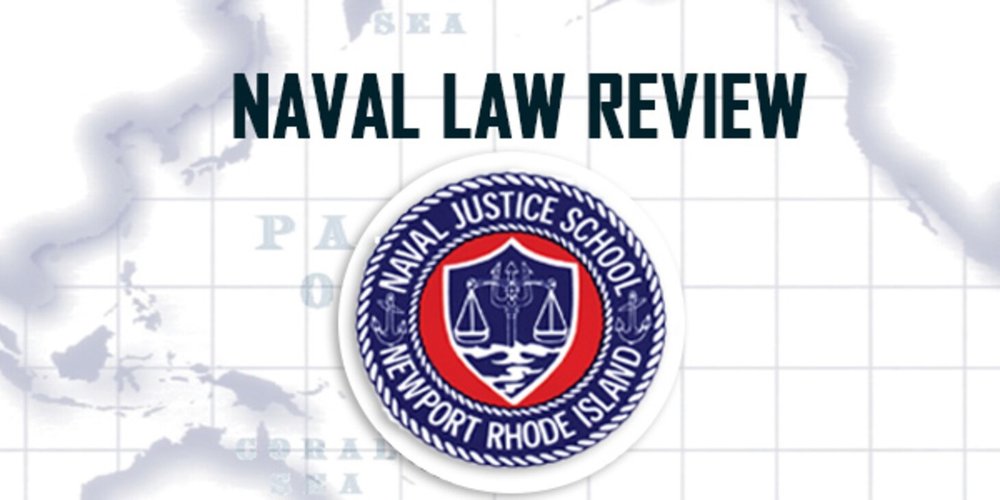After a three-year hiatus, the Naval Justice School has published a new volume of the Naval Law Review, a scholarly journal for military and civilian practitioners, as well as academia, who work in and study all aspects of the military’s legal practice.
The newly released Volume 66 explores topics ranging from the legality of mercy killings on the battlefield and applicability of U.S. v. Ramos to military courts-martial, to pressing issues in international and environmental law. The articles were authored and edited by a mix of active-duty and retired judge advocates from the Navy and other branches of service.
“The publication of the Naval Law Review is vital to fostering a culture of learning and continuous improvement among the Sea Service legal communities,” said Capt. Shane Cooper, commanding officer at Naval Justice School. “It provides our community with a platform to share new ideas and scholarship; we invite our readers to utilize the Naval Law Review to inform their legal practice and ongoing research.”
The Naval Law Review was revived in response to a growing demand signal from JAG community members for more opportunities to engage and learn from one another. The publication – which will be published annually, during the fall season – is an ideal way to encourage knowledge-building and conversation throughout the organization.
During the past several months, the Naval Law Review editorial board virtually convened several times to discuss each submitted article and, ultimately, reach consensus about which pieces to process for publication. The board members agree that they were fortunate to receive more high-quality submissions for Volume 66 than they had room to print.
One selected author is Lt. Cmdr. Tony Sham, who currently serves as staff judge advocate to Commander, Carrier Strike Group THREE. Thus far, Sham’s only operational experience is his individual augmentee assignment in 2012 with the Army in Afghanistan. He knew, however, that he wanted to write about the Law of Armed Conflict as it applies to the military’s boots-on-the-ground assets. His Naval Law Review article is entitled, “The House Built on Sand: An Analysis of Battlefield Mercy Killings in Non-International Armed Conflicts Under International Humanitarian Law and International Human Rights Law Regimes.”
“The writing process was incredibly unnerving and rewarding at the same time,” said Sham. “Suggesting that battlefield mercy killing might be permissible, or at least not expressly prohibited, by international law? The mere mention elicited strange looks. But, I've made a career of trying to think outside the box.”
“I knew that even if my conclusion was completely off the mark, the researching and writing process was the most important thing,” added Sham. “I'm very grateful to the Navy and the JAG community for affording me the opportunity to undergo that academic journey.”
Another selected author is Lt. Cmdr. Elizabeth O’Connor, who currently is assigned to the Office of the Judge Advocate General’s National Security Law division, where she is focused on cyber, space, and intelligence law. O’Connor has long been fascinated by underwater fiber optic cables, which enable communications via the ocean floor. While studying at The Fletcher School of Law and Diplomacy, O’Connor attended a Naval War College conference, and an idea for a research and writing project on this topic began to take shape. Her Naval Law Review article is entitled, “Underwater Fiber Optic Cables: A Customary International Law Approach to Solving the Gaps in the International Legal Framework for Their Protection.”
“I spent a lot of time researching, outlining, and thinking about how I wanted the article to flow prior to the actual writing,” said O’Connor. “I am fortunate to be surrounded by great people (most importantly, my wife), who were constantly there for me to bounce ideas off of as I was going through the researching and outlining process.”
“The end result is the product of multiple drafts,” O’Connor explained. “For me it was helpful to complete a draft, walk away for a few days and concentrate on something else, and then come back to it for another edit. I am excited for it to be published in the Naval Law Review and for others to learn more about this important issue.”
Looking ahead, the deadline for submissions to Volume 67 of the Naval Law Review is forecasted for May 2021. A specific deadline and directions for how to submit will be shared closer to the deadline; however, those interested in more information are encouraged to contact the Naval Law Review’s senior editorial team: Lt. Cmdr. Omer Duru (omer.duru2@navy.mil); Lt. Rich Culbert (richard.c.culbert@navy.mil); and Lt. SaraAnn Bennett (saraann.c.bennett@navy.mil).
